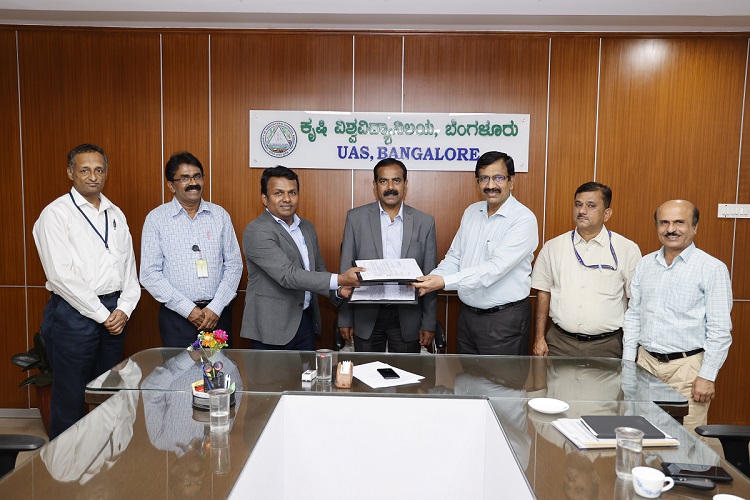Professor Maruthi Gowda has just signed an MOU – a Memorandum of Understanding – between the Natural Resources Institute (NRI), and the University of Agricultural Sciences Bangalore (UAS-B), to facilitate research, and the exchange of research material between the UK and India.
 The MOU relates specifically to the EU funded VIRTIGATION project which comprises 25 partners, and was launched to minimise crop losses by combatting emerging viral diseases in crops and help prevent them from spreading around the world.
The MOU relates specifically to the EU funded VIRTIGATION project which comprises 25 partners, and was launched to minimise crop losses by combatting emerging viral diseases in crops and help prevent them from spreading around the world.
Professor Gowda explains: “The movement and spread of plant viruses through infected seed is a real threat to food production worldwide. For example, the tomato leaf curl New Delhi virus was recently introduced to Europe, possibly from India and has been causing outbreaks of cucurbit - vegetables from the gourd family like cucumbers and squash - leaf curl disease in several European countries.”
“We don’t know how this virus was introduced into Europe. It could have been through infected seeds exchanged between India and Europe. In the VIRTIGATION project we will investigate this through the controlled exchange of research material like infected seeds, leaf samples, laboratory consumables, research ideas and partner visits between India and the UK. The MoU signed between NRI and UAS-B will facilitate seeking permission for importing research materials from India to the UK and vice versa to carry out this important research. In VIRTIGATION we will identify sustainable solutions to control these fast-spreading plant viral diseases.”
On the need to follow proper protocols in research collaborations, Prof Gowda says that historically, people would just pack plant samples into their suitcases and bags but now there is more awareness of how plant diseases spread and much stricter controls in place. He explains: “People should always obtain permission from the respective country authorities and have proper protocols in place prior to exporting and importing research samples in collaborations. In India, permissions are sought from the National Biosecurity Authority prior to importing research samples, which we will do using this MOU.”
By facilitating official permission for sharing research materials, the MOU can support India’s efforts to protect their intellectual property. One such incident occurred when a modern American patent was claimed 'discovering’ basmati rice, which has been grown and consumed in India for thousands of years. The rice was released for molecular research but without an MOU, so the system was abused by people trying to claim a patent on something that wasn’t rightly theirs. India has now put in stricter biosecurity rules to avoid such incidents.
Professor Gowda was pleased with the location of the MOU signing, a formal event that signified the value that is placed on the UK – India partnership. He says: “The signing took place at my old university – it was awesome to be in the same corridors and buildings that I was last in as a student, years ago, learning about research and formulating a career pathway as a scientist. During my visit I also gave a departmental lecture to the Plant Pathology Department, that’s where I gave my first ever professional presentation as a student – that felt very special to be back as a Professor in the place where I took my baby steps in academia.”
To find out more about:
University of Agricultural Sciences Bangalore

